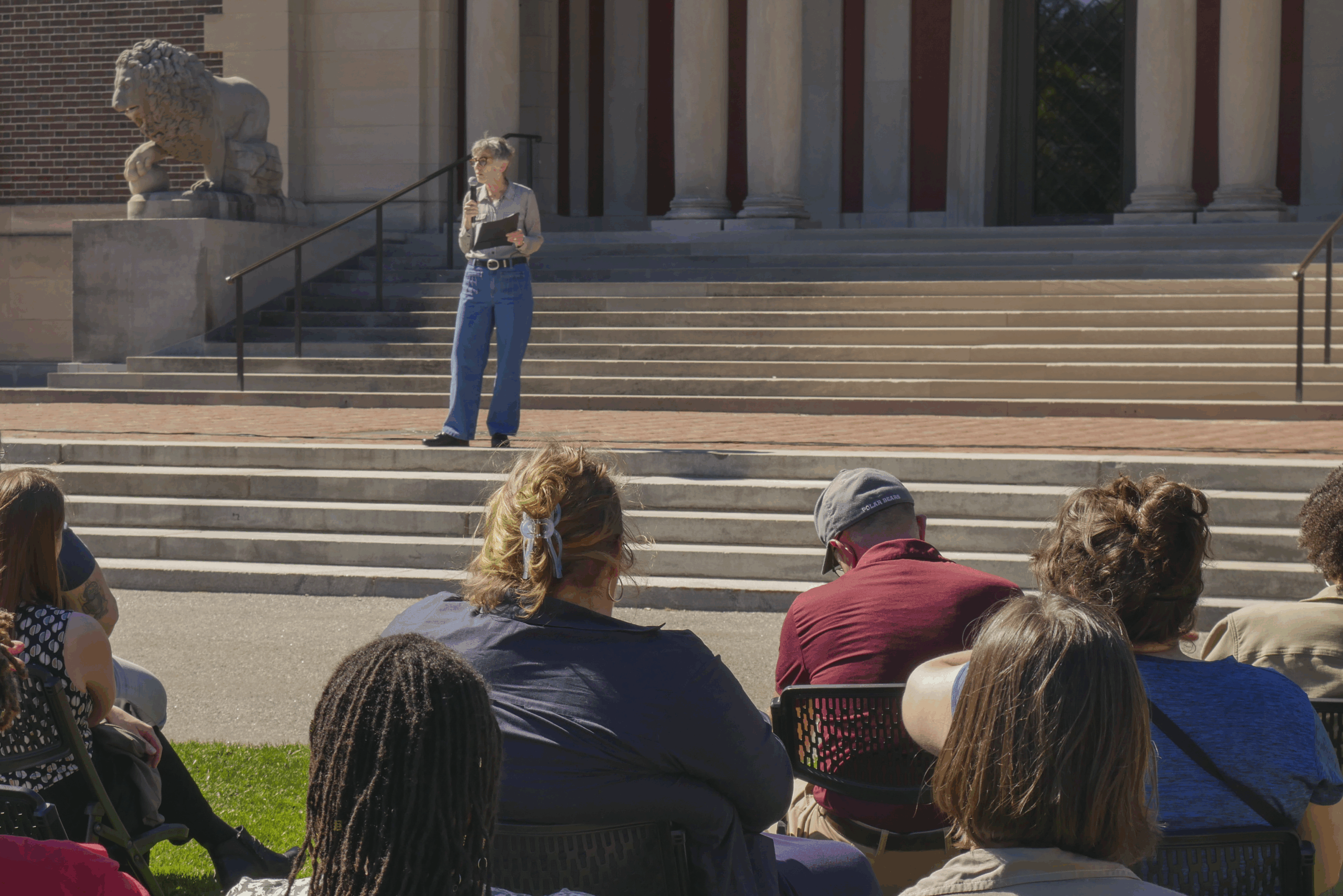AAUP rallies for academic freedom
September 26, 2025
 Michael Solano
Michael SolanoLast Friday, the sound of music, poetry and speeches filled the Main Quad as Bowdoin’s chapter of the American Association of University Professors (AAUP) brought students, professors and faculty together to rally for academic freedom on the steps of the Bowdoin College Museum of Art. The rally concluded AAUP’s academic freedom week, in which the group held panels and conversations about academic freedom in various contexts.
Aaron Kitch, professor of English and the chair of Bowdoin’s AAUP chapter, shared that the reason for the rally, and the week for academic freedom at large, was to respond to the recent attacks on academic freedom by the federal government.
“We actually started planning this last spring. We wanted to respond to the new threats on higher education and academic freedom, and as the event grew, we realized we couldn’t fit it into the spring semester, so we basically put it in the first week we could in September,” Kitch said.
The event consisted of over 15 individual speakers sharing what academic freedom meant to them. There was a diverse array of speeches and performances, from students reciting poetry, singing and dancing, to professors in various departments giving speeches on the importance of academic freedom both in their discipline and at large.
“We asked all speakers to focus on academic freedom as it relates to their life at Bowdoin … and why it’s important to them,” Kitch said. “We wanted to bring this [event] more to students in the community, whereas the forums [last week] were more about faculty and staff.”
Associate Professor of Government Jeffrey Selinger, one of the speakers at the event, spoke on academic freedom’s integral role in both the ability for professors to teach their students and for students to learn.
“Academic freedom is a blessing for faculty … but our students who get to take courses with faculty who can freely experiment without having to worry that they’ve transgressed some new public taboo … benefit more than anyone else from this thing we call academic freedom,” Selinger said. “And this freedom is not an indulgence. Our students … deserve it.”
Daniel Hennelly ’26 spoke about the attacks various institutions of higher education have faced from the federal government that have put academic freedom in harm’s way.
“We cannot stand idly by while our institution and other colleges around the nation are baselessly attacked by a government that prefers our capitulation to our freedom,” Hennelly said.
Cedar Greve ’26 focused their speech on the importance of academic freedom in regard to students organizing on campus for Palestinian liberation, citing last year’s encampment and the subsequent suspension of Bowdoin Students for Justice in Palestine.
In response to this, Kitch, one of the organizers of the event, informed the Orient that Greve’s speech violated the speaking guidelines that organizers asked students to follow.
“The speech broke our guidelines.… We asked [students] not to engage in political grandstanding or to mention anyone by name,” Kitch said.
In addition to speeches, the event had a musical performance from students in Miscellania, Bowdoin’s oldest historically all-female a capella group, as well as a dance segment in which students learned the historical significance of waacking, a dance style that emerged from the gay club scene in 1970s Los Angeles.
The last speaker, Aidan Aybar ’28, discussed how academic freedom provides him and his peers the ability to freely engage with their education, emphasizing the importance of academic debate and analysis.
“Academic freedom … means having professors selected for their scholarship and talent, not their political ideology or their willingness to pander to those in power. It means that in our classrooms, we are free to discuss and debate,” Aybar said. “We are able to celebrate the fact that every person on this campus has an idea to offer and a perspective to share.”

Comments
Before submitting a comment, please review our comment policy. Some key points from the policy: